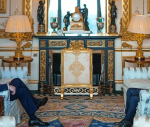You are here
Donald Trump, CEO
Jul 29,2017 - Last updated at Jul 29,2017
Suppose that a company’s board is seeking a new CEO. After an agonisingly long search, its members decide to go with a newcomer to the industry, claiming that the candidate will make the firm the market leader again. And, indeed, the new CEO shows up with big plans, spending the first six months dismantling and castigating past policies and practices, sometimes without rhyme or reason.
The CEO hires “yes men”, perhaps old colleagues, friends or even relatives. Possessing as little experience as the CEO and plenty of incentive to curry favour, they do not offer sound counsel.
Even if they did, the CEO would not take their advice. Add to that a lack of transparency, together with apparent violations of business ethics and basic leadership principles, and the CEO’s credibility quickly wanes.
The company’s skilled and experienced executives soon become frustrated with the new guard, and leave within a few months. This flight fuels a broader sense of fear and uncertainty among everyone from investors to employees, which is reinforced as it becomes apparent that the CEO isn’t fulfilling promises made during the interview process.
Within six months, the company is in disarray. It becomes clear that the CEO was hired on the basis of nothing more than bluster.
At that point, the board would be expected to step up and censure, if not fire, the failed CEO.
If they do not move quickly enough, there is a broad cohort of whistleblowers, unions, consumer advocates and others to give them the needed push, serving as a system of checks and balances.
Trump fancies himself America’s CEO; indeed, he won the presidency partly because he pitched himself as a successful business tycoon.
So he should be held to the same standard as a CEO of a large public multinational company — a standard that is going up, owing to increased scrutiny of corporate governance practices (despite Trump’s deregulation efforts).
So far, though, that standard is not being applied.
In his first six months as president, Trump has wrought far more damage than any single CEO could. He has seemingly breached every norm of his office. He has faced a constant stream of scandalous revelations regarding his inner circle’s ties with Russia. And he has produced no major legislative achievements.
In fact, every week, it seems, some new development emerges that, alone or in concert with the rest, would get a CEO fired.
For example, if any CEO walked into a meeting as ill-informed and poorly briefed as Trump often is, breezily spouting empty superlatives and faulty information, they would have quickly lost respect outside the company and support within it.
Just ask Elizabeth Holmes of Theranos, who attempted to build her blood-testing company on hot air and ended up losing all credibility.
In business, the emperor is quickly told the truth about his new clothes — unless, that is, it is a family business of the sort that Trump ran and frequently bankrupted.
The Trump administration is just such a “business”, which means that its senior employees have no alternative but to resign in the face poor (or even law-defying) management.
White House press secretary Sean Spicer was the first to throw in the towel — after barely six months on the job. He will not be the last.
Moreover, the old boys’ club is giving way to an environment of greater accountability in business.
Gone are the days when CEOs could disrespect female colleagues and contacts with impunity.
Yet, as with the appalling comments he made before becoming president, Trump has recently got away with insulting an Irish reporter (by interrupting a call with Ireland’s prime minister to discuss her appearance) and the wife of France’s president, on whose physique he commented.
Such comments are not just profoundly inappropriate; they also demonstrate incredibly poor judgment.
In the business world, a pattern like this would be noted, and eventually the company would be forced to take action.
If the CEO of American Apparel could not get away with such harassment, why should the president of the United States?
Likewise, why should Trump be able to play fast and loose with people’s health and wellbeing, attempting to bully his own colleagues in Congress to agree to a health-care bill that would take away coverage from millions?
When Martin Shkreli, the former CEO of Turing Pharmaceuticals, hiked the price of the toxoplasmosis drug Daraprim — a lifesaving treatment for AIDS patients — from $13.50 per tablet to $750, his reputation tanked.
He resigned in the wake of allegations that he appropriated company funds for personal use at previous companies where he worked. Shkreli now spends many of his days in court.
By contrast, Trump remains safe in his position as president, partly owing to the seemingly bottomless loyalty of many of his supporters. During the campaign, he proclaimed that even if he stood in the middle of Manhattan’s Fifth Avenue and shot somebody, he wouldn’t lose any voters.
And, for once, his claim wasn’t mere bluster: a recent poll indicated that 45 per cent of Trump voters would still support him if he shot someone.
But Trump’s overall approval rating has fallen substantially, reaching lows that only two previous presidents have touched in the first six months in office.
That means that there is a more fundamental problem at play: America’s system of checks and balances has so far failed to work as effectively as the US — and the world — needs it to.
Corporate governance is becoming stricter, based on a growing recognition of companies’ responsibility to ensure safe working environments, bar child labour, prevent environmental destruction, and end other damaging practices. Political governance should move in the same direction.
Trump is proud to be a businessman. So let us treat him like one and part company.
The writer is CEO of Marcus Venture Consulting. ©Project Syndicate, 2017. www.project-syndicate.org












